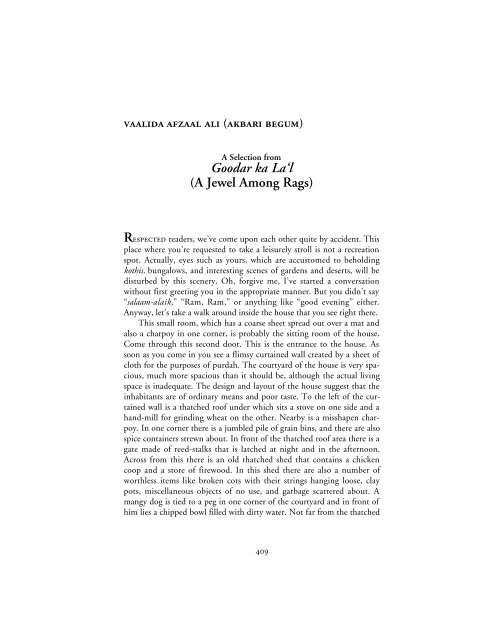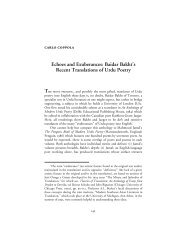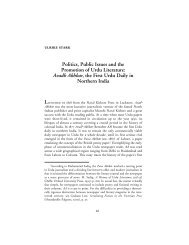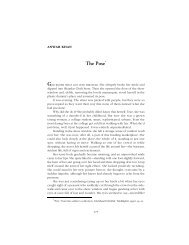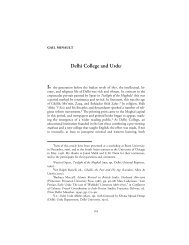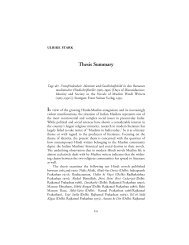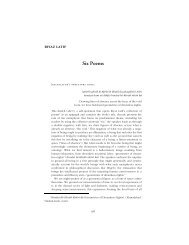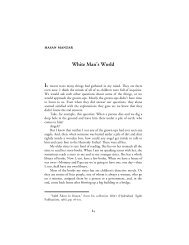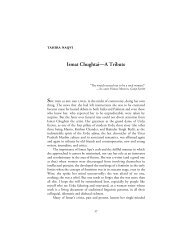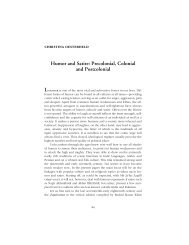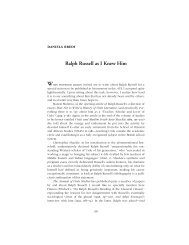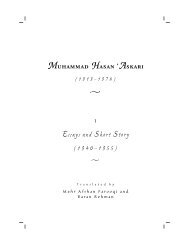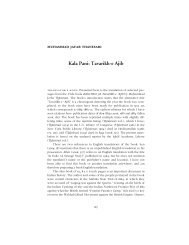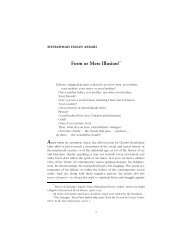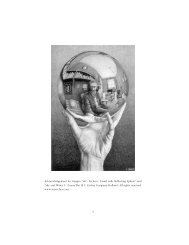Goodar ka La'l (A Jewel Among Rags) - the Annual of Urdu Studies
Goodar ka La'l (A Jewel Among Rags) - the Annual of Urdu Studies
Goodar ka La'l (A Jewel Among Rags) - the Annual of Urdu Studies
Create successful ePaper yourself
Turn your PDF publications into a flip-book with our unique Google optimized e-Paper software.
412 • THE ANNUAL OF URDU STUDIESShe placed her bedding on <strong>the</strong> morha and <strong>the</strong>n came back out to rollup <strong>the</strong> bedding from a cot whose occupant we haven’t seen because hehad become involved in his daily routine before we arrived. She took hisbedding into <strong>the</strong> raised courtyard. After putting <strong>the</strong> bedding down she<strong>of</strong>fered salaams in a sweet gentle voice to a handsome fourteen or fifteenyear-oldboy and he replied in a very affectionate tone. We’ve determinedat first glance that he is <strong>the</strong> beautiful girl’s bro<strong>the</strong>r because <strong>the</strong>re is a greatdeal <strong>of</strong> similarity in <strong>the</strong>ir features, coloring and demeanor. This boy’sclo<strong>the</strong>s consist <strong>of</strong> a pure white cotton pajama and <strong>ka</strong>miz, and a waistcoat<strong>of</strong> Ludhiana cloth. O<strong>the</strong>r than <strong>the</strong> waistcoat, his garments are all handstitched.Surely <strong>the</strong>y’ve been stitched by this pretty little girl. The boywent out and greeted his mo<strong>the</strong>r politely. Then he picked up his cot andtook it inside before carrying his sister’s cot to her room. The pretty littlegirl picked up a Turkish cap, removed <strong>the</strong> cloth in which it was wrapped,brushed it and placed it on a shelf next to a mirror which hung on <strong>the</strong>wall in <strong>the</strong> boy’s room. She also made his bed.Someone called at <strong>the</strong> door: “Take <strong>the</strong> milk.” The boy carried out acopper bowl. The girl retrieved a key from her pocket and opened a smallcupboard. She took out four biscuits, which were a dozen for six paisas,poured two teaspoonfuls <strong>of</strong> sugar in a saucer, got out two small bowls,put everything on a small tray and placed <strong>the</strong> tray on a stool. Her bro<strong>the</strong>rbrought in <strong>the</strong> fresh goat milk and both <strong>of</strong> <strong>the</strong>m had breakfast. Afterward<strong>the</strong> girl put back <strong>the</strong> leftover sugar, washed <strong>the</strong> saucer and <strong>the</strong> bowls andput those back in <strong>the</strong> cupboard as well, <strong>the</strong>n locked it and deposited <strong>the</strong>key in her pocket.The boy got ready for school. The girl locked <strong>the</strong> courtyard door andgave <strong>the</strong> key to him as he left. She returned to her room, removed a whiteburqa from <strong>the</strong> clo<strong>the</strong>s peg and placed her bag under her arm. She wasalso wearing a pure white cotton <strong>ka</strong>miz, which she stitched herself, awhite muslin covering, and a loosely-stitched pajama, different from <strong>the</strong>tight one her bro<strong>the</strong>r was wearing. Everything was so clean that <strong>the</strong>rewasn’t a spot <strong>of</strong> grease or ink anywhere. Because <strong>the</strong>re was a danger <strong>of</strong> <strong>the</strong>burqa becoming caught on something, it was cut somewhat high. She wasalso wearing white socks and, since high-heeled shoes weren’t allowed, shedonned a pair <strong>of</strong> simple sandals and came out. Latching her door she saidto Ghasiti, “Can you take me to Ustaniji’s.”Ghasiti: Child, wait just a bit.Girl: No, I’m late already. I woke up late today.Ameerunnisa: Why girl, do you think a person should get up in <strong>the</strong>middle <strong>of</strong> <strong>the</strong> night?
VAALIDA AFZAAL ALI • 415like a regular dandy. The maidservant had already prepared his hoo<strong>ka</strong>h.He took <strong>the</strong> pipe and drew on it. Amma was waking up <strong>the</strong> girl.Kher Ali: Amma, why are you waking her? Let her sleep. She doesn’thave to work. She’ll get up when she wants to.Ameerunnisa: The water-carrier will be coming along shortly.Kher Ali: Arre, put a covering on her or something. She’s just a child,she’s played in his lap all <strong>the</strong>se years.Ameerunnisa: You’re late today.Kher Ali: I’m not going to <strong>the</strong> chauki. I’ve taken a day <strong>of</strong>f. I’m goingto Appo’s. I’ll also have lunch <strong>the</strong>re, don’t cook anything for me. Amma,why don’t you speak to Phopho? If you are going to tell her <strong>the</strong>n do it,o<strong>the</strong>rwise tell me you won’t. I’ll do something about it myself. After all,how long will I sit around like this? My friends have had families for sucha long time. Majid has children now.Ameerunnisa: Mian, I’m more worried about this than you are. But<strong>the</strong> two or three matches I have in mind you’re not saying yes to. If youagree, I can arrange something with Kherunnisa today, but to tell you <strong>the</strong>truth I don’t have <strong>the</strong> nerve to bring up <strong>the</strong> question <strong>of</strong> Roshan AraBegum.Kher Ali: Throw Kherunnisa into <strong>the</strong> ashes! I’ll marry Roshan Araand no one else.Ameerunnisa: Why, you can’t use force here. She’s someone else’sdaughter, and if her parents don’t want to give her what can you do? Aperson should know how long his coverlet is before stretching his feet. In<strong>the</strong> first place, why would <strong>the</strong>y consider a poor family like ours? And if wedidn’t ask for Kherunnisa’s hand for Akhtar, why would we expect <strong>the</strong>mnow to agree to give <strong>the</strong>ir daughter? And if, by some stroke <strong>of</strong> goodfortune, we do get her, <strong>the</strong>n, my dear son, we won’t be able to provideher with <strong>the</strong> luxury she’s used to. All I know is, those who are poor fitbest with o<strong>the</strong>rs like <strong>the</strong>mselves. One should nei<strong>the</strong>r bring a girl from arich family nor give one.Kher Ali: Appo is married into a poor family, isn’t she?Ameerunnisa: Their station is still above ours and secondly, Hamidhas a job.Kher Ali: And I don’t? Hamid has just started working. He was astudent at <strong>the</strong> time <strong>of</strong> his marriage and, if you ask me, his status improvedonly after he was married. Hamid’s sitting room, Appo’s bedroom, <strong>the</strong>verandah and <strong>the</strong> bathroom—Appo was <strong>the</strong> one who had <strong>the</strong>m all built.And it was Appo who hired a servant to watch <strong>the</strong> door.
416 • THE ANNUAL OF URDU STUDIESAmeerunnisa: Hamid was studying, but he was doing—what do <strong>the</strong>ycall it—“mittle” (middle). And his job is better than yours. He’s a na’ibtehsildar and earns fifty rupees a month. You’re still just a clerk at tenrupees a month. And for that too we have to be grateful to Hamid. Heput in a good word to Chacha. And <strong>the</strong>n Hamid’s temperament is differentfrom Roshan Ara’s. Hamid loves us dearly while she can’t even bear tohear our name mentioned. She’s not only versed in English, Persian,Hindi and God knows what else—she has all five arts—so what kind <strong>of</strong>an opinion can she have <strong>of</strong> us? And she can’t get along with Amma. Also,right now, while she’s unmarried, she’s living in an area that has as muchspace as a family would need, with more room upstairs and downstairs, aswell as a garden, and not one but two or three servants in attendance. No,my dearest, I don’t see this desire <strong>of</strong> yours coming to fruition.Kher Ali: You’re not thinking <strong>of</strong> my welfare. Look how good it wasfor Phopho to have Appo married into her family. God willing, when Iget Roshan Ara I’ll no longer live in this rotten house, and what need willI have <strong>the</strong>n for this ten-rupee job? Her parents will take me in as a live-inson-in-law. But I won’t live with <strong>the</strong>m. We’ll all move to <strong>the</strong> house that’sin her name and we’ll fix this house up and rent it out. We’ll get ourshare <strong>of</strong> <strong>the</strong> inheritance and live in great comfort. Akhtar loves her verymuch and her share will be more than that <strong>of</strong> <strong>the</strong> o<strong>the</strong>r two sisters. I’mcertain that he’ll also allot her an income <strong>of</strong> at least two or three hundredrupees a month.Ameerunnisa: (laughing) This is all Sheikh Chilli type talk. I’ll beyour guest whe<strong>the</strong>r you like it or not. Akhtar will never allow <strong>the</strong> marriageto take place. You’ll see, he’ll get Tajammul Hussain as a match forher.Kher Ali: Why, I’ll kill <strong>the</strong> wretch! I’ll kill <strong>the</strong>m both. I’ll see towhe<strong>the</strong>r or not she marries Tajammul. Am I not Phopho’s nephew? Do Inot have some rights? It’s settled. You go today and take care <strong>of</strong> this onceand for all. I’ll visit a fakir, he’s very accomplished. God willing, my fortuneswill be reversed. Appo is my sister, Phopho holds me dearer thanshe does Akhtar.Ameerunnisa: It was my duty to give advice. She’s not only rich, she’salso very finicky. Don’t get involved in this muddle. Even if <strong>the</strong> marriagegoes through she’ll make life difficult for you. She’ll always regard you asinferior. Why, has anyone ever seized sugarcane from an elephant?Kher Ali: What can that unfortunate creature do to me? I’ll straightenher out so much that she’ll lose all her lordly airs. As for that nuisanceFeroz Mehri—I won’t allow her to enter my house. And I’ll make Roshan
VAALIDA AFZAAL ALI • 417Ara wear <strong>the</strong> veil in front <strong>of</strong> everyone except Rashid Hasan. And Icertainly won’t let her even brea<strong>the</strong> Tajammul’s name. All right, hurry upnow. I’m leaving, give me some paan and tobacco. The tobacco has lostits edge, I’ll freshen it before I go.Amma put <strong>ka</strong>ttha, chuna and tobacco on one-quarter <strong>of</strong> <strong>the</strong> paan andhanded it to him. He headed out haughtily and Ghasiti went away withmoney to buy <strong>the</strong> day’s provisions. As <strong>the</strong> day advanced <strong>the</strong> sunshineincreased.Ameerunnisa: (shaking her shoulder) Wake up Maqbool Begum, mysweet, <strong>the</strong> sun is on you now.Maqbool Begum: (whining) Hai Allah Mian, let me sleep, I’m feelingso wonderfully lazy.Ameerunnisa: Child, one <strong>of</strong> your in-laws might arrive for a visit.Phopho might come or even Kherunnisa. Get up now.Maqbool Begum: Hai Allah, you won’t let me sleep.Ameerunnisa: You must be hungry, you went to sleep early in <strong>the</strong>evening. Get up and eat.The mo<strong>the</strong>r awakens her with great difficulty. For a long time she sitson <strong>the</strong> bed rubbing her eyes. She yawns and stretches and <strong>the</strong>n she gets toher feet. Taking <strong>the</strong> stale bread and dal stored in <strong>the</strong> basket from lastnight’s supper, she begins eating.Ameerunnisa: I say, what is this laziness? You didn’t even wash yourface. First you couldn’t be troubled to eat and now you can’t wait.Maqbool Begum: I’m so weak with hunger. When I was asleep Ididn’t feel anything.Ameerunnisa: (laughing) And what if I hadn’t wakened you?Maqbool Begum: I wouldn’t have felt <strong>the</strong> hunger pangs while I wasasleep.Ameerunnisa: Iqbal is younger than you, and look how early shewakes up.Maqbool Begum: Don’t say that wretch’s name in front <strong>of</strong> me.Ghasiti: God forbid—what has she done to you?Ameerunnisa: You’re always cursing her. She doesn’t pester anyone,she keeps to herself. She wakes up in <strong>the</strong> morning, says her prayers, rollsup her bedding and <strong>the</strong>n, donning her burqa, leaves for <strong>the</strong> maktab andreturns in <strong>the</strong> evening. If she stays home she studies or embroiders, and ifshe’s not doing that she goes to <strong>the</strong> kitchen to help mama with kneading<strong>the</strong> dough or browning <strong>the</strong> spices, or she’ll make roti. If she sees me doingsomething she immediately takes over my chore.
418 • THE ANNUAL OF URDU STUDIESMaqbool Begum: Yes I know what kind <strong>of</strong> a daughter she is. Theonly person who keeps her in line is A<strong>ka</strong> Bhai. Everyone else has beenhoodwinked by her.Ameerunnisa: How has she hoodwinked you? She can’t stop callingyou “Apajaan, Apajaan.” It would be more appropriate if you sewedclo<strong>the</strong>s for her since you’re <strong>the</strong> older sister, but instead, she’s <strong>the</strong> one whostitches your clo<strong>the</strong>s as well as her own.Maqbool Begum: So she shouldn’t <strong>the</strong>n. All we have to do is spend afew paisas and anyone will stitch clo<strong>the</strong>s for us. How lucky sheis—everyone dotes on her. When we go to visit, Bhai Akhtar and his sisterdon’t talk to us properly. But when it’s her, <strong>the</strong>y invite her to stay at<strong>the</strong>ir house. What a pretty twenty-rupee durrie <strong>the</strong>y sent her to use in herroom, and also a chair. They’ve never sent us anything. And <strong>the</strong>y also giveher money and clo<strong>the</strong>s on Eid and Baqr-Eid, even if Appo and Phophodon’t give us poor creatures anything.Ameerunnisa: Why do you take your feelings <strong>of</strong> envy out on her? Shekeeps saying she doesn’t want anything. But she does know how to takecare <strong>of</strong> her things, and <strong>the</strong> poor girl uses every paisa <strong>of</strong> her own money forall her expenses, including clo<strong>the</strong>s, shoes, and books. Bro<strong>the</strong>r and sisterpay <strong>the</strong> dhobi for <strong>the</strong> wash from <strong>the</strong>ir own pocket. And we don’t get aregular milk delivery so <strong>the</strong>y also pay for milk once in <strong>the</strong> morning andagain in <strong>the</strong> evening. But you—you misspend everything you get.Maqbool Begum: Well, <strong>the</strong>y must have <strong>the</strong> milk because <strong>the</strong>y can’tswallow stale bread. No one stops <strong>the</strong>m from eating.Ameerunnisa: Well <strong>the</strong>y study, and if <strong>the</strong>y don’t drink a ta<strong>ka</strong>’s worth<strong>of</strong> milk how can <strong>the</strong>y do that?Maqbool Begum: I say, that’s nonsense. Shakir is also studying.Ghasiti: By God’s will, <strong>the</strong>ir education is more difficult. Shakir hasbeen reading <strong>the</strong> primer for six months now.Maqbool Begum: Just stop taking <strong>the</strong>ir side now.Ameerunnisa: Child, speak s<strong>of</strong>tly, your voice will carry to <strong>the</strong> o<strong>the</strong>rside.Maqbool Begum: (eating) Dadda, Dadda—oh my God! Is she deaf?My throat is hoarse from screaming. I pray that <strong>the</strong>ir eardrums burst and<strong>the</strong>y become mute for not replying to us.Ameerunnisa: Child, your throat is like a torn drum. Your in-laws arejust on <strong>the</strong> o<strong>the</strong>r side <strong>of</strong> <strong>the</strong> wall, have some shame.Maqbool Begum: S<strong>of</strong>tly? Why even you accuse me. Look I’mscreaming and she’s not listening.
VAALIDA AFZAAL ALI • 419Ameerunnisa: She’s busy with some chore. Tell me, what do youwant?Maqbool Begum: My dear mo<strong>the</strong>r, could you bring me a little gur?This dal tastes a bit sour.Ameerunnisa: My goodness! These children won’t leave <strong>the</strong> guralone. What will I do if tomorrow or <strong>the</strong> day after he asks for it. Hebrought it home for himself.She goes inside and, after dipping her hand in <strong>the</strong> jar, returns emptyhandedand angry.Ameerunnisa: There’s no sign <strong>of</strong> any gur <strong>the</strong>re. Did you start in on itlike an ant? You’re not one to leave it alone and now he’ll scream at me.He’s in a bad mood because <strong>of</strong> this new whim <strong>of</strong> his. He has a beard nowand still isn’t married. I’ll be rid <strong>of</strong> all this aggravation when he has a wifeto take care <strong>of</strong> her husband’s things.Maqbool Begum: (in a whining voice) Why are you scolding us?Your dear one must have eaten it. We don’t even know where it’s kept.Ameerunnisa: Everyone is dear to me. Who was <strong>the</strong> one who used tomix it with chanas every day and eat it with Najaf?Someone rattles <strong>the</strong> chain on <strong>the</strong> door and Maqbool runs into herroom.Ameerunnisa: Who is it? Come in.A woman: (coming in) Bhabi salaam. Why were you getting soangry? What’s <strong>the</strong> matter?Ameerunnisa: Qamarunnisa, what can I say. These children havemade life miserable for me. Kher Ali had brought home some gur which,when he felt like it, he occasionally ate after a meal. The children havefinished it <strong>of</strong>f without my knowledge. Now when he asks for it, what willI say?Qamarunnisa: Bhabi, <strong>the</strong>y’re children, don’t feel so annoyed. Theo<strong>the</strong>r day your nephew sent us some ten seers <strong>of</strong> gur. You know YusufRaza doesn’t touch such things, and anything so rich doesn’t suit me.Kherunnisa is also not that fond <strong>of</strong> eating. It’s just sitting <strong>the</strong>re. I did tellhim to take some over to his bro<strong>the</strong>r’s children, but he probably forgot.(calling out) Kherunnisa, daughter, come here, will you.Kherunnisa: (coming to <strong>the</strong> window) Mumani salaam. What is itAmma?Qamarunnisa: Child, you didn’t send <strong>the</strong> gur over for <strong>the</strong> children.Kherunnisa: Amma, it’s all weighed and put in <strong>the</strong> jar. I forgot.Kherunnisa is dressed in a narrow-cut twill gharara, a pink dupattawith black edging, a beige-colored shirt embellished with a ribbon and
420 • THE ANNUAL OF URDU STUDIESwith pink cuffs that are embroidered with a wavy border. She’s wearingan amulet around her neck, tiny hoops in her ears, and anklets with smallround bells. Her anklets tinkling, she came in with <strong>the</strong> jar.Ameerunnisa: (seeing <strong>the</strong> jar) Why this is just like <strong>the</strong> one Kher Alibrought. He said Imamuddin had given it to him.Qamarunnisa: Imamuddin had gone to get it and it was he whobrought it for us as well. Now what you must do is separate Kher Ali’sshare, put it in <strong>the</strong> bukhari and lock it, <strong>the</strong>n give <strong>the</strong> children <strong>the</strong> rest.Ameerunnisa: What children? Hasan Raza and Iqbal don’t touch itand Maqbool doesn’t eat it all <strong>the</strong> time. But this Shakir <strong>of</strong> yours is a realdevil.Qamarunnisa: (laughing) Bhabi, he’s just a boy.At her sister-in-law’s insistence she saves a portion for Kher Ali, storesit in <strong>the</strong> bukhari and puts a lock on <strong>the</strong> lid. Then she sends Maqbool alittle <strong>of</strong> <strong>the</strong> gur. Qamarunnisa and Kherunnisa return home. Soon afterward,Najeeb Khan Changi’s daughter, Najaf, arrives in a doli andMaqbool greets her warmly and takes her to her room. Why don’t we alsonow have a look at this room. Oho, we’re feeling very uncomfortable nowthat we’re here. There’s one bed in <strong>the</strong> room and it has a broken leg supportedby bricks. Because <strong>the</strong> foot section is in tatters, <strong>the</strong> center <strong>of</strong> <strong>the</strong>bed is sagging. A soiled durrie covers part <strong>of</strong> <strong>the</strong> bed. There are playingcards scattered about in one corner. The floor is red from paan spittle and<strong>the</strong>re are splatters <strong>of</strong> <strong>the</strong> same on <strong>the</strong> walls as well. Under <strong>the</strong> bed, in onecorner, <strong>the</strong>re’s a pile <strong>of</strong> betel nuts that have been chewed and spit out. On<strong>the</strong> o<strong>the</strong>r side, <strong>the</strong> floor is wet and muddy. Cobwebs hang from <strong>the</strong> ceilingand walls. Flies and mosquitoes abound because <strong>of</strong> <strong>the</strong> dankness and<strong>the</strong> filth. Dirty clo<strong>the</strong>s lie <strong>of</strong>f to one side. Maqbool takes her friend and,sweeping aside <strong>the</strong> things on <strong>the</strong> bed with her hand, she sits down <strong>the</strong>rewith her. For a while <strong>the</strong> two chat and laugh and giggle, <strong>the</strong>n <strong>the</strong>y playwith dolls and, when <strong>the</strong>y get bored with that too, Najaf Khanum suggests<strong>the</strong>y play cards.At twelve o’clock Hasan Raza returns from school.Hasan Raza: Amma, did you send Suraiya Jabeen [Iqbal] lunch yet?Ameerunnisa: No, not yet.Hasan Raza: Send it <strong>the</strong>n, this is her hour for a break.After this conversation about his sister’s lunch, he unlocks his doorand goes into his room. When he has changed his clo<strong>the</strong>s he comes outand finds four chapatis along with a small bowl <strong>of</strong> kuddoo gosht set out ona soiled tablecloth.
VAALIDA AFZAAL ALI • 421Hasan Raza: Ammajaan, does lunch go out wrapped in this tableclo<strong>the</strong>very day?Ameerunnisa: No, she leaves a white towel, a bowl and a plate.Hasan Raza: She didn’t leave all that with you today?Ameerunnisa: No, she did, but Maqbool sent for <strong>the</strong> dahi bare in <strong>the</strong>bowl, and <strong>the</strong> plate went to Phopho’s for sevaiyan which Maqbool took toher friend along with rotis wrapped in <strong>the</strong> white towel.Hasan Raza: (with some irritation) Ammajaan, it’s degrading thatfood be sent to someone’s house in this fashion.Ameerunnisa; Well, it’s your doing, isn’t it? Does she have to work?We’re poor and whatever <strong>the</strong>re is in <strong>the</strong> house we eat. Taking food overto someone else’s house is difficult.Hasan Raza: She’s not asking for pulao or korma for someone else’shouse. All she’s asking for is cleanliness. She’s bought some copper utensilsfor herself but those are never where <strong>the</strong>y should be and you end upsending her food in such a disgraceful manner.Ameerunnisa: Well, we had a guest in <strong>the</strong> house. Should <strong>the</strong> girl havetaken her food in <strong>the</strong> unpolished utensils? What’s this mine and yoursbusiness—whoever needs something should be able to use it.Hasan Raza: I agree, but don’t place <strong>the</strong> blame for all this on SuraiyaJabeen’s studying. If you had asked me I would have given you ano<strong>the</strong>rtowel and plate.Hasan Raza brought her a white towel, a plate and a bowl. Placing<strong>the</strong> rotis on <strong>the</strong> plate with <strong>the</strong> bowl <strong>of</strong> salan on top, Ghasiti wrapped everythingin <strong>the</strong> towel and carried it to Suraiya Jabeen.*Lightning and rain are my taleSome <strong>of</strong> it truths about my tears, some mydistressLife’s experiences attest to <strong>the</strong> fact that <strong>the</strong>re is no country or nationwhere marriage deserves to be called marriage in <strong>the</strong> true sense <strong>of</strong> <strong>the</strong>word. For example, even a husband and wife who share something as rareand precious as harmony and love, eventually become tangled in differentkinds <strong>of</strong> anxiety and distress and are forced to reminisce longingly about<strong>the</strong> peaceful, carefree lives <strong>the</strong>y once enjoyed before marriage. But marriagesin Hindustan, especially <strong>the</strong> marriages <strong>of</strong> Hindustani Muslims, arenot really marriages, <strong>the</strong>y are ruination. In some households <strong>the</strong> concept
422 • THE ANNUAL OF URDU STUDIES<strong>of</strong> “flesh and blood” is seriously considered; that is, lineage and classshould not be flawed in any way, and actually, this is a very appropriateconsideration because if such distinctions are not made <strong>the</strong>n <strong>the</strong> characterand conduct <strong>of</strong> <strong>the</strong> children suffer unfavorable consequences. Childrenwill exhibit <strong>the</strong> same temperament as <strong>the</strong>ir parents. However, oneshouldn’t completely drown in <strong>the</strong> search for “flesh and blood.” As a matter<strong>of</strong> fact, it’s quite necessary to keep o<strong>the</strong>r things in mind as well.Some people attach <strong>the</strong>ir daughters to totally illiterate, uncouth menfor <strong>the</strong> sake <strong>of</strong> wealth. Some stupid mo<strong>the</strong>rs give <strong>the</strong>ir daughters away inresponse to family obligations and pressures, and in <strong>the</strong>se cases marriagestake place at a very young age. The boy is barely sixteen or seventeen andhis nature and character can’t be determined at this age. Ah, <strong>the</strong>seoppressed individuals <strong>of</strong> Hindustan are forced by <strong>the</strong> loyalties <strong>of</strong> <strong>the</strong>irparents to become a prey to marriage, <strong>the</strong>y smolder all <strong>the</strong>ir lives and <strong>the</strong>nfinally go to sleep in <strong>the</strong>ir graves. They leave this world in a state <strong>of</strong>extreme anguish. May God bless <strong>the</strong>m with great rewards in <strong>the</strong> afterlifefor <strong>the</strong> cruelty <strong>the</strong>y have endured and for <strong>the</strong>ir patient suffering. Ah, <strong>the</strong>oppressed women who leave this world must, by God’s grace, sleep peacefully,but those [men] who hope that a horrible end will follow <strong>the</strong> sorrowfullives <strong>of</strong> <strong>the</strong>se women, may <strong>the</strong>y be tormented until <strong>the</strong> day <strong>of</strong>judgment. When he recalls <strong>the</strong> disconsolate manner in which <strong>the</strong> poorwoman turned away from her mortal life, may <strong>the</strong> memory <strong>of</strong> <strong>the</strong> dyingwoman’s helplessness torment him more than <strong>the</strong> shock <strong>of</strong> imminentdeath and make him shed tears <strong>of</strong> regret. Ah, parents <strong>of</strong> Hindustan, havemercy on your beloved <strong>of</strong>fspring and have mercy on <strong>the</strong> hearts who willlove your beloved <strong>of</strong>fspring, who will shed tears at <strong>the</strong> helplessness andoppression <strong>of</strong> your beloved <strong>of</strong>fspring. Don’t entrust <strong>the</strong>m to cruel,unkind, illiterate, uncouth vagabonds merely for <strong>the</strong> sake <strong>of</strong> wealth, familyobligations, or out <strong>of</strong> concern for flesh and blood. Don’t entrust <strong>the</strong>mto husbands who possess hearts that can’t distinguish between good andbad or truth and lies, who ascribe equal value to a stone and a ruby, orra<strong>the</strong>r, give preference to <strong>the</strong> stone over <strong>the</strong> ruby, who can’t value yourfaithful icons <strong>of</strong> chastity, virtue and modesty, <strong>the</strong> ultimate symbols <strong>of</strong>decorum, talent, intelligence and good behavior, and who, ignoring <strong>the</strong>m,will become caught in <strong>the</strong> tangles <strong>of</strong> those who are indecent, shrewd, illmannered,lacking in talent and disloyal—<strong>the</strong> ultimate symbol <strong>of</strong> greedand selfishness—and thus bring <strong>the</strong>ir world to ruin. So, observe now thata similar scene presents itself. Sar<strong>ka</strong>r Dulhan, that is Nanhe Mirza’s wife,has received no comfort or joy since <strong>the</strong> day she was married, but she isfrom a good family, she is upstanding in character. Although she has been
VAALIDA AFZAAL ALI • 423a prey to sorrow and pain since <strong>the</strong> day <strong>of</strong> her marriage, she is moredistressed than ever at <strong>the</strong> moment because <strong>of</strong> her husband’sdisappearance. It is two o’clock in <strong>the</strong> afternoon. The heat is intense. Hermo<strong>the</strong>r, uncle, <strong>the</strong> kitchen help—everyone is asleep, but she is tossingand turning. She cannot feel a moment’s rest.*Preparations for <strong>the</strong> engagement begin on both sides. At Kherunnisa’shouse <strong>the</strong> arrangements have to be supervised by Hamida Begum, but onthis side too Hamida Begum and Nawab Begum are in charge. And whynot? They are <strong>the</strong> ones bearing <strong>the</strong> expenses. Four tailors are installed outsideand four seamstresses are brought in to take care <strong>of</strong> <strong>the</strong> sewing in <strong>the</strong>house. The walls in Kher Ali’s house have already been white-washedbecause <strong>of</strong> <strong>the</strong> wedding. Floor coverings, durries, floor sheets, and lightingdevices have been rented for <strong>the</strong> occasion.On <strong>the</strong> appointed day Kherunnisa is ba<strong>the</strong>d and bedecked as a bridewith mehndi, jewelry and clo<strong>the</strong>s. A floor covering is laid out in her smallroom and <strong>the</strong> bedstead is tightened to make it firm and <strong>the</strong>n moved toone side.The two aunts and a female cousin help Kher Ali dress up as a bridegroom.He dons a red tight-pajama <strong>of</strong> Hindustani gulbadan with a Lahorisilken waist cord and puts on saleem shahi shoes embroidered in pure goldthread, a white gach shirt, and a pink satin ach<strong>ka</strong>n. He places a Banarsidupatta around his neck, a silken handkerchief on his head, garlands <strong>of</strong>flowers on his wrists and neck and a sehra on his cap.There is one tray <strong>of</strong> batashas, several o<strong>the</strong>rs containing coconuts, andone tray each <strong>of</strong> almonds, pistachios, dried dates and misri. A tray for <strong>the</strong>bride contains jewelry made from flowers, a sehra, a gold ring, set with agold bead instead <strong>of</strong> a gem, and a wedding band. A paisa, a rupee and asovereign are stitched into a narrow strip <strong>of</strong> red silken cloth. Beautifulcoverings, which came with Hamida Begum’s dowry, have been placedover all <strong>the</strong> trays.Carriages have been rented. The groom’s mo<strong>the</strong>r, sisters and o<strong>the</strong>rfemale relatives are seated in one or two <strong>of</strong> <strong>the</strong> covered carriages, andriding in <strong>the</strong> horse-driven carriage are <strong>the</strong> groom, his friends, male relativesand Ameer Ali Beg. Forming a procession to <strong>the</strong> best <strong>of</strong> <strong>the</strong>ir ability,<strong>the</strong>y start <strong>of</strong>f to <strong>the</strong> accompaniment <strong>of</strong> music and dancing. Shakir, whoseclo<strong>the</strong>s are also new and made <strong>of</strong> silk, is with <strong>the</strong> men. All <strong>of</strong> this is distastefulto Hasan Raza but, dressed in suitable and appropriate clo<strong>the</strong>s, he
424 • THE ANNUAL OF URDU STUDIESreluctantly accompanies everyone. However, he lags behind becausedancing is <strong>the</strong> one thing he abhors most. Taking <strong>the</strong> long route, <strong>the</strong> processionarrives at <strong>the</strong> bride’s house.Hamid Ali’s friends and relatives are present here to receive <strong>the</strong>guests. Hamid is a decent man so his friends are also those who staywithin <strong>the</strong> bounds <strong>of</strong> civilized behavior. They welcome <strong>the</strong> guests graciouslyand <strong>of</strong>fer <strong>the</strong> groom’s party elaborate hospitality as is <strong>the</strong> custom.First <strong>the</strong> nai presents <strong>the</strong> guests with sweet drinks. Mirza Ameer Ali Begplaces ten rupees in <strong>the</strong> bowl as he has been instructed. Next paans andcardamom pods are distributed and hoo<strong>ka</strong>hs and pechwans are placedbefore each guest.The female in-laws get out <strong>of</strong> <strong>the</strong> carriages inside <strong>the</strong> house. At first aspray <strong>of</strong> water, spouting out from <strong>the</strong> door to <strong>the</strong> courtyard, is sprinkledin front <strong>of</strong> <strong>the</strong>m and <strong>the</strong>n <strong>the</strong>y’re seated with a great deal <strong>of</strong> respect anddeference. The domnis begin singing welcoming songs to <strong>the</strong> accompaniment<strong>of</strong> a drum. Married and unmarried girls, widows, mo<strong>the</strong>rs, sisters,sisters-in-law—<strong>the</strong> domnis spare no one when it comes to <strong>the</strong> obscenepr<strong>of</strong>anities that are a part <strong>of</strong> <strong>the</strong>ir songs. And for this <strong>the</strong>y are generouslyrewarded. Suraiya Jabeen is rooted to <strong>the</strong> ground with embarrassment butfinally she gets up and returns to her house. Since <strong>the</strong>re is dancing takingplace outside as well, Hasan Raza and Yusuf also choose not to stay in <strong>the</strong>center <strong>of</strong> <strong>the</strong> wedding assembly and stroll <strong>of</strong>f to where a namak chashidish is being prepared in a large pot.Afterward <strong>the</strong> female in-laws are given sweet drinks, and a garland,each one made <strong>of</strong> flowers and twisted golden threads, is placed around<strong>the</strong>ir necks. Then a woman brings a small bowl <strong>of</strong> sandalwood paste.After first dabbing a little on <strong>the</strong> foreheads <strong>of</strong> <strong>the</strong> in-laws, she begins rubbingit <strong>of</strong>f vigorously with a coarse, rough handkerchief, a process that isquite painful; it brings tears to <strong>the</strong> women’s eyes but it’s a custom and<strong>the</strong>y have to endure it with smiles and laughter. One or two <strong>of</strong> <strong>the</strong> guestswho are high-spirited give this woman a taste <strong>of</strong> her own medicine. Afterall, <strong>the</strong> in-laws aren’t outsiders; <strong>the</strong>y’re related to each o<strong>the</strong>r on bothsides.Then everyone starts putting a mark on <strong>the</strong> bride. The bride sits withboth <strong>of</strong> her hands on a handkerchief which covers her face. SuraiyaJabeen is sent for to put on <strong>the</strong> bride’s sehra.Hamida: Even now you had to go and hide in <strong>the</strong> house. Youcouldn’t stay here.Suraiya Jabeen: Apajaan, <strong>the</strong>re was singing going on here so I left.Hamida: Oho, what a mullani you are.
VAALIDA AFZAAL ALI • 425Suraiya makes no reply and fastens <strong>the</strong> sehra around her sister-inlaw’shead. Her mo<strong>the</strong>r gives her five rupees for tying <strong>the</strong> sehra. An imamzamin is placed around <strong>the</strong> bride’s arm. A hairy coconut, toasted grams,batashas, almonds, pistachios, five fistfuls <strong>of</strong> dried dates and five rupeesare placed in her lap, and <strong>the</strong> ring and <strong>the</strong> wedding band are put on herfingers. Shouts <strong>of</strong> “Congratulations” arise. The first-look ceremonybegins. First Nawab Begum takes a look at <strong>the</strong> bride’s face and <strong>the</strong>n slipsgold bracelets on her wrists. Her mo<strong>the</strong>r-in-law gives her five rupees andHamida Begum and Qamarunnisa do <strong>the</strong> same. Ano<strong>the</strong>r five rupees are<strong>of</strong>fered on behalf <strong>of</strong> Ameer Ali, and Suraiya is handed two rupees to makeher gift. All <strong>the</strong> o<strong>the</strong>r relatives also view <strong>the</strong> bride’s face and bestow asmuch as <strong>the</strong>ir means and <strong>the</strong>ir status will allow.When <strong>the</strong> ceremony <strong>of</strong> salaami is over outside, <strong>the</strong> bridegroom comesinside for <strong>the</strong> salaami ceremony. Women from both sides <strong>of</strong>fer as much as<strong>the</strong>y had given to <strong>the</strong> bride during <strong>the</strong> first-look ceremony. Altoge<strong>the</strong>r <strong>the</strong>salaami adds up to one hundred and fifty rupees. A loud-mou<strong>the</strong>d femalesays, “Mian, always be a dog at this threshold.”Qamarunnisa: Why should he be a dog? He’s our own son, dearer tous than Hamid Yusuf.The in-laws were getting ready to leave. A gold-embroidered, goldedgedhandkerchief made <strong>of</strong> gokhru, an imam zamin, a ring and a weddingband for <strong>the</strong> bridegroom, fifty silken handkerchiefs trimmed withjust a gold edging, two and a half mans sweets for distribution amongfamily members, and a large pot <strong>of</strong> mutanjan for namak chashi was sent<strong>of</strong>f with <strong>the</strong> groom’s family. On <strong>the</strong>ir return to <strong>the</strong>ir house Kher Ali andhis friends have supper and <strong>the</strong>n all <strong>the</strong> men settle down on a floor coveringin <strong>the</strong> outer courtyard. The dancing girl performs all night and <strong>the</strong>bridegroom and his friends tease her with sly, obscene remarks. The hoo<strong>ka</strong>his freshened intermittently. And why not? After all, <strong>the</strong> groom hasearned a hundred and fifty rupees, and he’s not spending anything on <strong>the</strong>wedding from his own pocket.At <strong>the</strong> girl’s house too <strong>the</strong> domnis sing all night. In <strong>the</strong> morningsweets and dried fruits are distributed in both households. There is sometalk like this at <strong>the</strong> time <strong>of</strong> <strong>the</strong> breaking <strong>of</strong> <strong>the</strong> hairy coconut:Ameerunnisa: By God’s will, may a new pit come out <strong>of</strong> it so that shemay have a son like <strong>the</strong> moon.Hamida: Son, daughter—all are Allah’s bounty.As it happens an old and well-worn pit emerges which silenceseverybody.Ghasiti: The first child will be a girl.
426 • THE ANNUAL OF URDU STUDIESNawab Begum: The first daughter is like a son.Half <strong>of</strong> <strong>the</strong> dried fruits and <strong>the</strong> money are distributed among <strong>the</strong>brides in <strong>the</strong> family. The rest is divided into two parts and is given toSuraiya Jabeen and Maqbul Begum. Maqbul Begum divides her shareinto two and sends one part to Najaf; she is also a sister after all. Thehandkerchiefs, except <strong>the</strong> one for <strong>the</strong> bridegroom, are also distributed.Suraiya Jabeen took <strong>of</strong>f <strong>the</strong> edging from hers and gave it to her mo<strong>the</strong>r.*Suraiya Jabeen makes several very fine, delicate copies <strong>of</strong> <strong>the</strong> picture andwraps <strong>the</strong>m in a silken handkerchief which she has embroidered herself.She has decided to send <strong>the</strong>m to Shakeel Ara. Then, God knows whatpasses through her mind, she removes <strong>the</strong> handkerchief and wraps <strong>the</strong>pictures in paper before she gives <strong>the</strong>m to an attendant to take to ShakeelAra. The pictures have been prepared expertly and beautifully. Everyonelikes <strong>the</strong>m. Roshan Ara, who is particularly interested in photography andwho takes very good photographs herself, has high praise for <strong>the</strong> pictures.Since Suraiya Jabeen has <strong>the</strong> plates she designs new pictures using only<strong>the</strong> top parts <strong>of</strong> <strong>the</strong> originals. In one she puts Hasan Raza by himself, inano<strong>the</strong>r Ashiq Abbas is flanked by Hasan Raza and Yusuf Raza. One cansay without exaggeration that she produces at least a dozen pictures.When she is done, she takes a magnifying glass and peers closely at everyone’sfeatures. God knows what passes through her mind but she suddenlytears up all <strong>the</strong> pictures and throws <strong>the</strong>m into <strong>the</strong> coal brazier. Aslong as <strong>the</strong> papers are burning she stares at <strong>the</strong>m and when <strong>the</strong>y’rereduced to ashes she retires to bed.But on <strong>the</strong> following Sunday we find her engaged in <strong>the</strong> same activity.This time, however, she produces a new innovation. Taking <strong>the</strong> pictures<strong>of</strong> every famous man and woman she can find in her room, she putshis picture next to each <strong>of</strong> <strong>the</strong>m separately. In ano<strong>the</strong>r photo she placeshis picture in <strong>the</strong> middle and creates an oval design by arranging <strong>the</strong> o<strong>the</strong>rpictures around his like a halo around <strong>the</strong> sun. Then she arranges all <strong>the</strong>pictures on a table and after examining each one minutely with <strong>the</strong> magnifyingglass, she addresses herself thus:“Can I exhibit <strong>the</strong>se pictures in front <strong>of</strong> my bro<strong>the</strong>r? Or can I show<strong>the</strong>m to my sister-in-law or anyone else? Or can <strong>the</strong>y, like furniture, be apart <strong>of</strong> <strong>the</strong> décor <strong>of</strong> my room? Or …“No, not at all! So, should I hide <strong>the</strong>m by storing <strong>the</strong>m in my suitcase?The pictures <strong>of</strong> a strange man? Even though <strong>the</strong>se are <strong>the</strong> result <strong>of</strong> a
VAALIDA AFZAAL ALI • 427lot <strong>of</strong> hard work on my part and <strong>the</strong>y reveal my creativity as an artist? Butthis goes against my conscience, and my conscience [in English] upbraidsme.”Like <strong>the</strong> o<strong>the</strong>r pictures she tears <strong>the</strong>m up and throws <strong>the</strong>m into <strong>the</strong>fire.“I made some pictures last Sunday and burned <strong>the</strong>m and this Sundaytoo I was engaged in a similarly absurd task. So it’s best that I destroy <strong>the</strong>plates from which I’ve made <strong>the</strong>se copies.”Having decided to do this she proceeds to break nearly two dozenplates with <strong>the</strong> original images on <strong>the</strong>m, and <strong>the</strong>n, breathing a sigh <strong>of</strong>relief she goes to her bed and lies down.“I’ve made a terrible mistake in taking <strong>the</strong> plates from Shakeel AraBegum. This was not at all proper. But why is it my fault? I had refusedbut Bhabi Afzaal insisted that I take <strong>the</strong>m. God knows what she had inmind when she gave me <strong>the</strong> picture. All <strong>of</strong> <strong>the</strong>m are experts at every kind<strong>of</strong> painting and photography. Oho! I remember now. She also took mypicture in Akhtar Hasan’s garden. Why did she do that? Oh, so what.They’re nawabs, I’m <strong>the</strong> sister <strong>of</strong> a poor pr<strong>of</strong>essor: What connection does<strong>the</strong> earth have to <strong>the</strong> sacred sky?“I’ve been learning medical science for four years, I passed myentrance exam by studying without any real purdah so I shouldn’t be soweak as to see a piece <strong>of</strong> paper and become obsessed with it. Sure, <strong>the</strong> featuresreveal an unusual intelligence and discernment, also good natureand refinement, but what concern is it <strong>of</strong> mine? My Bhaijaan is master <strong>of</strong>what is good and bad for me.“Then … (after a moment’s silence) Isn’t it possible that after I finishmy education I might devote my life to <strong>the</strong> welfare <strong>of</strong> those <strong>of</strong> my ownsex? Without salary or any o<strong>the</strong>r compensation teach at <strong>the</strong> AligarhWomen’s School? Besides <strong>the</strong> o<strong>the</strong>r subjects also teach medicine as <strong>the</strong>need arises? And <strong>of</strong>fer treatment when <strong>the</strong> occasion calls for it? To meetmy own needs I could earn enough by providing treatment to <strong>the</strong>respectable women <strong>the</strong>re. My Bhaijaan and Bhai Yusuf Raza are bothplanning to live in Aligarh. They’re here only until I finish my education.They’re both planning to devote two hours each day to teaching at <strong>the</strong>regular girls’ school. So what’s <strong>the</strong> harm if I decide to do <strong>the</strong> same?“Perhaps Bhaijaan will not agree. How will it harm him if he doesn’tforce me against my inclination?“At <strong>the</strong> moment my age is twenty-two years and because <strong>of</strong> my educationalneeds I don’t observe <strong>the</strong> formal Hindustani purdah strictly. ByGod’s grace I’ve lead my life properly up to now. I haven’t experienced
428 • THE ANNUAL OF URDU STUDIESweakness even in my thoughts. If I want to lead an independent life, myguardians will be worried about me for maybe eight or ten years. But if Iwant to live by shutting my heart to <strong>the</strong> pressures <strong>of</strong> <strong>the</strong> world <strong>the</strong>n <strong>the</strong>reis no reason for <strong>the</strong>m to worry. Isn’t my previous lifestyle enough to satisfy<strong>the</strong>m?“May God help me! How weak I am. No, no. I’m faithful to my dearbro<strong>the</strong>r. He has done what no bro<strong>the</strong>r has ever done for a sister. He hasalways been desirous <strong>of</strong> my future welfare and well-being. At such ayoung age he endured not only <strong>the</strong> vicissitudes <strong>of</strong> his own life and educationbut mine as well and allowed me to get <strong>the</strong> education I wanted.Now, when <strong>the</strong> time has come that he should be relieved <strong>of</strong> his responsibilitytoward me, I’ll present my opinion opposing his because <strong>of</strong> <strong>the</strong>weakness <strong>of</strong> my heart. No, no, this will never happen. It’s true, I’ll be distressed.But I’ll never express an opinion that contradicts my bro<strong>the</strong>r’s.There’s still almost a year left until I’m finished with college, and thatonly if I pass this year. This year I may not feel <strong>the</strong> way I have up to now.“Bahaijaan and Bhabi Sartaj are my relatives and <strong>the</strong>y’ve always beenconsiderate <strong>of</strong> my feelings, but why are <strong>the</strong>ir o<strong>the</strong>r relatives, especiallyShakeel Ara and her sister-in-law so nice to us? And in <strong>the</strong> same way ShahzadaShakeel has been friends with Dulha Bhai and Bhaijaan since <strong>the</strong>ywere children, but Bhaijaan and everyone else make a point <strong>of</strong> praisingNawab Farrukh Hasan, always saying how he’s very amicable and pleasantwhenever he meets <strong>the</strong>m. Actually, <strong>the</strong> whole family is very friendlyand sociable. No one exhibits any arrogance or pomposity. Bhaijaanalways has nothing but praise for Nawab Agha Ashiq Abbas Hasan, andindeed how warmly he greets Bhaijaan. It’s been four years since he cameto Lahore and he has stayed with Bhaijaan continuously. My Bhaijaanspeaks highly <strong>of</strong> him, frequently praising his manners, his knowledge, andhis o<strong>the</strong>r qualities. I’ve seen his picture. One can tell by looking at his facethat he’s a very intelligent, learned and good-natured person.“Oho! It’s one o’clock and I’m still awake. I must go to sleep now. Ihaven’t been getting enough sleep for many days. I seem to have lost myappetite as well. Perhaps it’s because I don’t sleep properly. If my healthfails my studies will suffer. I should take some sleeping medicine. Thismorning Bhabijaan was inquiring after my health. I know that I’m somewhatlethargic. This isn’t right. I’ll take one dose <strong>of</strong> <strong>the</strong> medication forsleeping so that I can rest peacefully for <strong>the</strong> remainder <strong>of</strong> <strong>the</strong> night. Andin <strong>the</strong> morning I’ll start taking <strong>the</strong> medication for improving my appetite.I’ve received a letter from Shakeel Ara Begum. Should I write her a replyor not? Not replying to a letter is bad manners. If I do reply <strong>the</strong>n she’ll
VAALIDA AFZAAL ALI • 429write me ano<strong>the</strong>r letter and our association will grow, but I don’t want toget too close to her.“Ah! I’m just a poor pr<strong>of</strong>essor’s sister. She’s <strong>the</strong> daughter <strong>of</strong> a nawab.The wife and daughter-in-law <strong>of</strong> princes. She and I don’t belong toge<strong>the</strong>r.I hope she doesn’t come to Lahore for <strong>the</strong> exhibition. I’ll write to her andsay I won’t be able to write again because <strong>of</strong> a lack <strong>of</strong> free time. Well, it’stwo o’clock now. I won’t be able to sleep.”With this in mind she gets up and takes a small dose <strong>of</strong> <strong>the</strong> medicinewhich won’t last more than two or three hours. ❐—Translated by Tahira NaqviGlossaryangarkha (agark^≥): a type <strong>of</strong> garment worn by men.bahuji (bah∑-jµ): daughter-in-law; “ji” used as an honorific.banat (bn≥t): gold or silver lace or edging.bukhari (bukh≥rµ): a hole or pit in a corner <strong>of</strong> <strong>the</strong> house to store grain—granary.chauki (±aukµ): a small low wooden stool.dahi bare (dahµba∞®): a snack consisting <strong>of</strong> small patties made from lentil flourand dipped in whipped yogurt flavored with spices.domnis (dåmnµ): dancing girls.gach (ga±): a type <strong>of</strong> coarse cotton cloth.gharara (ghar≥ra): a garment with flared legs and pleated borders worn bywomen.gokhru (gåk^r∑): type <strong>of</strong> intricately worked edging used on women’s garments.gulbadan: a type <strong>of</strong> fine silk cloth.imam zamin (im≥m-¤≥min): a ribboned band containing money and tied on <strong>the</strong>right arm to invoke <strong>the</strong> aid <strong>of</strong> <strong>the</strong> Imam in warding <strong>of</strong>f bad luck.juzdan (juzd≥n): a cloth in which books, especially <strong>the</strong> Qur’≥n, are wrapped; asatchel.kothis (kåª^µ): bungalows.
430 • THE ANNUAL OF URDU STUDIESkuddoo gosht (<strong>ka</strong>dd∑ gåsht): dish <strong>of</strong> meat and a squash-like vegetable.kurti (kurtµ): a shirt worn over shalv≥r by women (also kurt≥, which is worn byboth men and women).maktab: a school.mama: (m≥m≥): nanny.markin (m≥rkµn): a type <strong>of</strong> cotton fabric.mullani (mull≥nµ): feminine <strong>of</strong> mullah—a cleric.mutanjan: a dish containing both sweet, flavored rice and pulao, rice cooked withspices and meat.neela thotha (nµl≥-t^åt^≥): type <strong>of</strong> poisonous chemical mixed with whitewash andused on interior walls to repel scorpions, etc.na’ib tehsildar (n≥’ib te√Ωµld≥r): assistant district <strong>of</strong>ficer.namak chashi (namak ±ashµ): any salted food that will be tasted first in aceremony.nijaaf (nij≥f ): probably a design that is part <strong>of</strong> <strong>the</strong> shirt in question.pechwans (p®±v≥n): a hoo<strong>ka</strong>h having a long, coiling snake-like smoker’s pipe.salan (s≥lan): equivalent <strong>of</strong> curry.salaami (sal≥mµ): gift <strong>of</strong> money given to bride and groom.saleem shahis (salµm-sh≥hµ): special kind <strong>of</strong> flat shoe worn by men and women.sevaiyan (sevaiy≥): vermicelli.susi (s∑sµ): a type <strong>of</strong> woven cotton with its own particular design.ta<strong>ka</strong> (tak≥): a copper coin equal to two paisas.takhti (takhtµ): a wooden tablet used to write on to learn <strong>the</strong> <strong>Urdu</strong> script.


